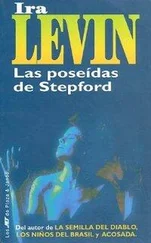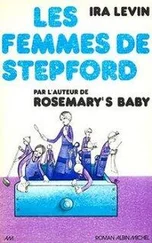Ira Levin
THIS PERFECT DAY
Christ, Marx, Wood, and Wei
Led us to this perfect day.
Marx, Wood, Wei, and Christ;
All but Wei were sacrificed.
Wood, Wei, Christ, and Marx
Gave us lovely schools and parks.
Wei, Christ, Marx, and Wood
Made us humble, made us good.
—child’s rhyme for bouncing a ball
ACITY’S blank white concrete slabs, the giant ones ringed by the less giant, gave space in their midst to a broad pink-floored plaza, a playground in which some two hundred young children played and exercised under the care of a dozen supervisors in white coveralls. Most of the children, bare, tan, and black-haired, were crawling through red and yellow cylinders, swinging on swings, or doing group calisthenics; but in a shadowed corner where a hopscotch grid was inlaid, five of them sat in a close, quiet circle, four of them listening and one speaking.
“They catch animals and eat them and wear their skins,” the speaker, a boy of about eight, said. “And they—they do a thing called ‘fighting.’ That means they hurt each other, on purpose, with their hands or with rocks and things. They don’t love and help each other at all.”
The listeners sat wide-eyed. A girl younger than the boy said, “But you can’t take off your bracelet. It’s impossible.” She pulled at her own bracelet with one finger, to show how safely-strong the links were.
“You can if you’ve got the right tools,” the boy said. “It’s taken off on your linkday, isn’t it?”
“Only for a second.”
“But it’s taken off, isn’t it?”
“Where do they live?” another girl asked.
“On mountaintops,” the boy said. “In deep caves. In all kinds of places where we can’t find them.”
The first girl said, “They must be sick.”
“Of course they are,” the boy said, laughing. “That’s what ‘incurable’ means, sick. That’s why they’re called incurables, because they’re very, very sick.”
The youngest child, a boy of about six, said, “Don’t they get their treatments?”
The older boy looked at him scornfully. “Without their bracelets?” he said. “Living in caves?”
“But how do they get sick?” the six-year-old asked. “They get their treatments until they run away, don’t they?”
“Treatments,” the older boy said, “don’t always work.”
The six-year-old stared at him. “They do,” he said.
“No they don’t.”
“My goodness,” a supervisor said, coming to the group with volley balls tucked one under each arm, “aren’t you sitting too close together? What are you playing, Who’s Got the Rabbit?”
The children quickly hitched away from one another, separating into a larger circle—except the six-year-old boy, who stayed where he was, not moving at all. The supervisor looked at him curiously.
A two-note chime sounded on loudspeakers. “Shower and dress,” the supervisor said, and the children hopped to their feet and raced away.
“Shower and dress!” the supervisor called to a group of children playing passball nearby.
The six-year-old boy stood up, looking troubled and unhappy. The supervisor crouched before him and looked into his face with concern. “What’s wrong?” she asked.
The boy, whose right eye was green instead of brown, looked at her and blinked.
The supervisor let drop her volley balls, turned the boy’s wrist to look at his bracelet, and took him gently by the shoulders. “What is it, Li?” she asked. “Did you lose the game? Losing’s the same as winning; you know that, don’t you?”
The boy nodded.
“What’s important is having fun and getting exercise, right?”
The boy nodded again and tried to smile.
“Well, that’s better,” the supervisor said. “That’s a little better. Now you don’t look like such a sad old sad-monkey.”
The boy smiled.
“Shower and dress,” the supervisor said with relief. She turned the boy around and gave him a pat on his bottom. “Go on,” she said, “skedaddle.”
The boy, who was sometimes called Chip but more often Li—his nameber was Li RM35M4419—said scarcely a word while eating, but his sister Peace kept up a continuous jabbering and neither of his parents noticed his silence. It wasn’t until all four had seated themselves in the TV chairs that his mother took a good look at him and said, “Are you feeling all right, Chip?”
“Yes, I feel fine,” he said.
His mother turned to his father and said, “He hasn’t said a word all evening.”
Chip said, “I feel fine.”
“Then why are you so quiet?” his mother asked.
“Shh,” his father said. The screen had flicked on and was finding its right colors.
When the first hour was over and the children were getting ready for bed, Chip’s mother went into the bathroom and watched him finish cleaning his teeth and pull his mouthpiece from the tube. “What is it?” she said. “Did somebody say something about your eye?”
“No,” he said, reddening.
“Rinse it,” she said.
“I did.”
“Rinse it.”
He rinsed his mouthpiece and, stretching, hung it in its place on the rack. “Jesus was talking,” he said. “Jesus DV. During play.”
“About what? Your eye?”
“No, not my eye, Nobody says anything about my eye.”
“Then what?”
He shrugged. “Members who—get sick and—leave the Family. Run away and take off their bracelets.”
His mother looked at him nervously. “Incurables,” she said.
He nodded, her manner and her knowing the name making him more uneasy. “It’s true?” he said.
“No,” she said. “No, it isn’t. No. I’m going to call Bob. He’ll explain it to you.” She turned and hurried from the room, slipping past Peace, who was coming in closing her pajamas.
In the living room Chip’s father said, “Two more minutes. Are they in bed?”
Chip’s mother said, “One of the children told Chip about the incurables.”
“Hate,” his father said.
“I’m calling Bob,” his mother said, going to the phone.
“It’s after eight.”
“He’ll come,” she said. She touched her bracelet to the phone’s plate and read out the nameber red-printed on a card tucked under the screen rim: “Bob NE20G3018.” She waited, rubbing the heels of her palms tightly together. “I knew something was bothering him,” she said. “He didn’t say a single word all evening.”
Chip’s father got up from his chair. “I’ll go talk to him,” he said, going.
“Let Bob do it!” Chip’s mother called. “Get Peace into bed; she’s still in the bathroom!”
Bob came twenty minutes later.
“He’s in his room,” Chip’s mother said.
“You two watch the program,” Bob said. “Go on, sit down and watch.” He smiled at them. “There’s nothing to worry about,” he said. “Really. It happens every day.”
“Still?” Chip’s father said.
“Of course,” Bob said. “And it’ll happen a hundred years from now. Kids are kids.”
He was the youngest adviser they had ever had—twenty-one, and barely a year out of the Academy. There was nothing diffident or unsure about him though; on the contrary, he was more relaxed and confident than advisers of fifty or fifty-five. They were pleased with him.
He went to Chip’s room and looked in. Chip was in bed, lying on an elbow with his head in his hand, a comic book spread open before him.
Читать дальше











